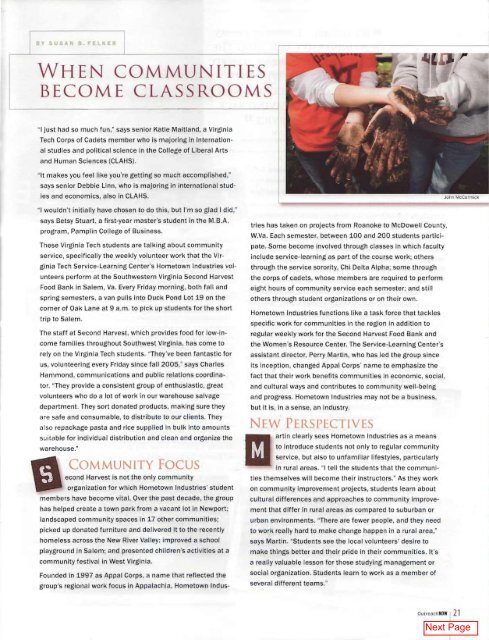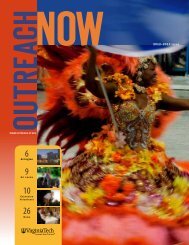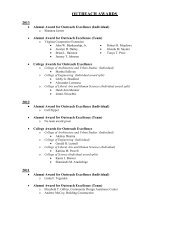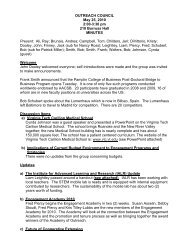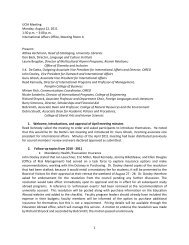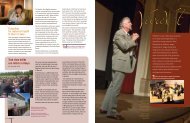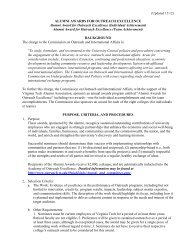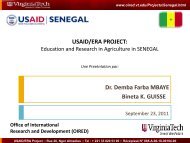Beautiful Gardens - Outreach & International Affairs - Virginia Tech
Beautiful Gardens - Outreach & International Affairs - Virginia Tech
Beautiful Gardens - Outreach & International Affairs - Virginia Tech
- No tags were found...
Create successful ePaper yourself
Turn your PDF publications into a flip-book with our unique Google optimized e-Paper software.
BY SUSANELKERWHEN COMMUNITIESBECOME CLASSROOMS"I just had so much fun," says senior Katie Maitland, a <strong>Virginia</strong><strong>Tech</strong> Corps of Cadets member who is majoring in internat ionalstudies and political science in the College of Liberal Artsand Human Sciences (CLAHS),"It makes you feel like you're getting so much accomplished,"says senior Debbie Linn , who is majoring in international studiesand economics, also in CLAHS,"I wouldn't initially have chosen to do this, but I'm so glad I did,"says Betsy Stuart a first-year master's student in the M,B,A.program, Pamplin College of Business,These <strong>Virginia</strong> <strong>Tech</strong> students are talking about communityservice, specifica1ly the weekly volunteer work that the <strong>Virginia</strong><strong>Tech</strong> Service-Learning Center's Hometown Industries volunteersperform at the Southwestern <strong>Virginia</strong> Second HarvestFood Bank in Salem, Va , 'Every Friday morning, both fall andspring semesters, a van pulls into Duck Pond Lot 19 on thecorner of Oak Lane at 9 a,m . to pick up students for the shorttrip to Salem,The staff at Second Harvest, which provides food for low ~ incomefamilies throughout Sout,hwest <strong>Virginia</strong>, has come torely on the <strong>Virginia</strong> <strong>Tech</strong> students. "They've been fantastic forus, volunteering every Friday since fall 2005," says CharlesHammond, communications and public relations coordinator."They provide a consistent group of enthusiastic, greatvolunteers WllO do a lot of work in our warehouse salvagedepartment. Tiley sort donated products, making sure theyare safe and consumable, to distribute to our clients. Theyalso repackage pasta and rice supplied in bulk into amolilltssuitable for individual distribution and clean and organize thewarehouse."COMMUNITY FOCUSecond Harvest is not the only communityorganization for which Hometown Industries' stlldentmembers have become vital. Over the past decade, the grouphas helped create a town park from a vacant lot in Newport;landscaped community spaces in 17 other communities;picked up donated furniture and delivered it to the recentlyhomeless across the New River Valley: improved a schoolplayground in Salem: and presented children'S activities at acommuni,ty festival in West <strong>Virginia</strong>.Founded in 1997 as Appal Corps, a name that reflected thegroup's regional work focus in Appalachia, Hometown Indus-tries has taken on projects from Roanoke to McDowell County,W.va, Each semester, between 100 and 200 students participate.Some become involved through ciasses in which facul,tyinclude service-learning as part of the course work; othersthrough the service sorority, Ch i! Delta Alpha; some throughthe corps of cadets, whose members are required to performeight hours of community service each semester; and stili'others through student organizations or on their own .Hometown Industries functions like a task force that tacklesspecific work for communities in the region in addition toregular weekly work for the Second Harvest Food Bank andthe Women's Resource Center. The Service-Learning Center'sassistant director, Perry Martin, who has led the group sinceits inception, changed Appal Corps' name to emphasize thefact that their work benefits communities in economic, social ,and cultural ways and contributes to commllnity well-beingand progress. Hometown Industries may not be a business.but it is, in a sense, an industry.artin clearly sees Hometown Industries as a meansto introduce students not only to regular communityservice, but also to unfamiliar lifestyles, particularlyin rural areas. "I tell the students that the communities themselves will become their instructors." As they work on community improvement projects, students learn about cultural differences and approaches to community improvement that differ in rural areas as compared to suburban or urban environments. "There are fewer people, and they need to work really hard to make change happen in a rural area," says Martin. "Students see the local volunteers' desire to make things better and their pride in their communities, It's a really valuable lesson for those studying management or social organization. Students learn to work as a member of several different teams."' John McCorm ickOulreaC/I NOW ! 21


